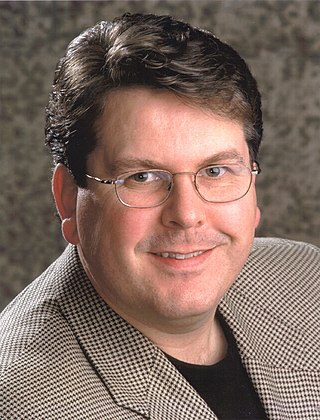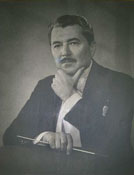Related Research Articles

John Towner Williams is an American composer and conductor. In a career that has spanned seven decades, he has composed some of the most popular, recognizable and critically acclaimed film scores in cinema history. He has a very distinct sound that mixes romanticism, impressionism and atonal music with complex orchestration. He is best known for his collaborations with Steven Spielberg and George Lucas and has received numerous accolades including 26 Grammy Awards, five Academy Awards, seven BAFTA Awards, three Emmy Awards and four Golden Globe Awards. With 54 Academy Award nominations, he is the second-most nominated person, after Walt Disney, and is the oldest Oscar nominee in any category, at 91 years old.
Joan Tower is a Grammy-winning contemporary American composer, concert pianist and conductor. Lauded by The New Yorker as "one of the most successful woman composers of all time", her bold and energetic compositions have been performed in concert halls around the world. After gaining recognition for her first orchestral composition, Sequoia (1981), a tone poem which structurally depicts a giant tree from trunk to needles, she has gone on to compose a variety of instrumental works including Fanfare for the Uncommon Woman, which is something of a response to Aaron Copland's Fanfare for the Common Man, the Island Prelude, five string quartets, and an assortment of other tone poems. Tower was pianist and founding member of the Naumburg Award-winning Da Capo Chamber Players, which commissioned and premiered many of her early works, including her widely performed Petroushskates.

Jerrald King Goldsmith was an American composer known for his work in film and television scoring. He composed scores for five films in the Star Trek franchise and three in the Rambo franchise, as well as for films including Logan's Run, Planet of the Apes, Tora! Tora! Tora!, Patton, Papillon, Chinatown, The Omen, Alien, Poltergeist, The Secret of NIMH, Medicine Man, Gremlins, Hoosiers, Total Recall, Basic Instinct, Air Force One, L.A. Confidential, Mulan, and The Mummy. He also composed the fanfares accompanying the production logos used by multiple major film studios, and music for the Disney attraction Soarin'.
Call of the Champions is a fanfare for orchestra and choir composed by John Williams for the 2002 Winter Olympics in Salt Lake City, Utah. Premiering at the Opening Ceremony on February 8, 2002, it began with the call by the Mormon Tabernacle Choir of "Citius! Altius! Fortius!", which is the Olympic Motto chosen by the founder of the modern Games, Baron Pierre de Coubertin.

The music of the Star Wars franchise is composed and produced in conjunction with the development of the feature films, television series, and other merchandise within the epic space opera multimedia franchise created by George Lucas. The music for the primary feature films was written by John Williams. Williams' work on the series included the scores of nine feature films, a suite and several cues of thematic material for Solo and the theme music for the Galaxy's Edge Theme Park. These count among the most widely known and popular contributions to modern film music, and utilize a symphony orchestra and features an assortment of about fifty recurring musical themes to represent characters and other plot elements: one of the largest caches of themes in the history of film music.

Star Wars Episode III: Revenge of the Sith – Original Motion Picture Soundtrack is the film score to the 2005 film of the same name released by Sony Classical on May 3, 2005, more than two weeks before the film's release. The music was composed and conducted by John Williams, and performed by the London Symphony Orchestra and London Voices in February 2005, with orchestrations provided by Conrad Pope and Eddie Karam. The score was Williams' sixth score in the saga. Shawn Murphy recorded the score. Ramiro Belgardt and Kenneth Wannberg served as music editors; Wannberg served as music editor for the previous Star Wars scores. A remastered version of the soundtrack was released by Walt Disney Records on May 4, 2018.

Sin City: Original Motion Picture Soundtrack is the soundtrack to the 2005 film Sin City. It features music composed by Robert Rodriguez, John Debney and Graeme Revell, performed by the Hollywood Studio Symphony, as well as the orchestral track "Sensemayá" from Mexican composer Silvestre Revueltas and the electronica piece "Absurd" by Fluke.

Allan Gilliland is a contemporary Canadian composer.

Alexander is the original film score of the film Alexander (2004), scored by Greek electronic composer Vangelis. It received the Public Choice Award at the 2005 World Soundtrack Academy.

Leo Arnaud or Léo Arnaud was a French American arranger, composer, and orchestrator of film scores. He composed "Bugler's Dream", which is used as the theme by television networks presenting the Olympic Games in the United States.

Peter Boyer is an American composer, conductor, orchestrator, and professor of music. He is known primarily for his orchestral works, which have received over 600 performances, by more than 250 orchestras.
Gary Alan Kulesha is a Canadian composer, pianist, conductor, and educator. Since 1995, he has been Composer Advisor to the Toronto Symphony Orchestra. He has been Composer-in-Residence with the Kitchener-Waterloo Symphony (1988–1992) and the Canadian Opera Company (1993–1995). He was awarded the National Arts Centre Orchestra Composer Award in 2002.

The Last Airbender is the soundtrack album of the fantasy adventure film The Last Airbender, directed by M. Night Shyamalan. The score was composed by James Newton Howard. It was released on June 29, 2010, by Lakeshore Records.
For New York (Variations on Themes of Leonard Bernstein) (originally titled To Lenny! To Lenny!) is a one-movement orchestral composition by the American composer John Williams. Written as a tribute to fellow composer and conductor Leonard Bernstein, the piece premiered on the last day of Bernstein's 70th birthday gala at Tanglewood on August 28, 1988. The premiere was performed by the Boston Symphony Orchestra under Williams, who was then conductor of its sister orchestra, the Boston Pops. Music critic John Rockwell of The New York Times described the work as "feathery and flashy."
Javelin is a composition for orchestra by American composer Michael Torke. It was finished in 1994.
American Journey is a six-part orchestral composition by the American composer John Williams. The piece was commissioned by U.S. President Bill Clinton to accompany a multimedia presentation titled The Unfinished Journey directed by Steven Spielberg for the 2000 "Millennium" celebrations. The work premiered at the Lincoln Memorial in Washington, D.C. on New Year's Eve, 1999.
Loco is an orchestral composition in one movement by the American composer Jennifer Higdon. The work was commissioned by the Ravinia Festival of Highland Park, Illinois to commemorate the Ravinia train as part of the Train Commission Project. It was first performed on July 31, 2004, at the Ravinia Festival by the Chicago Symphony Orchestra.
Spangled Unicorn is a composition for brass ensemble by the British-born composer Anna Clyne. The work was commissioned by the Chicago Symphony Orchestra, for which Clyne was then composer-in-residence. It was first performed on March 21, 2011, at Symphony Center, Chicago by the brass section of the Chicago Symphony Orchestra.

The Olympic Hymn is a 1981 composition by Leonard Bernstein to a text by Günter Kunert. It was written for the International Olympic Congress of 1981 in Baden-Baden, West Germany. It was premiered by the Southwest German Radio Symphony Orchestra and the Baden-Baden Youth Choir under conductor David Shallon on 23 September 1981. The piece opened the proceedings of the International Olympic Congress.
References
- 1 2 Burlingame, Jon (February 21, 2014). "Film Composers Achieve Olympic Victory: Tiomkin music to be featured in Sochi closing ceremony". The Film Music Society . Retrieved February 27, 2015.
- ↑ "Summon the Heroes - Deluxe Score". Hal Leonard Online. Retrieved 1 January 2021.
- 1 2 Clemmensen, Christian (January 14, 2002). "American Journey (John Williams)". Filmtracks.com . Retrieved February 27, 2015.
- ↑ Dilling, Margaret W. (1997). "Review of The sound of the Games: Music for the 1996 Centennial Olympics; Summon the Heroes, ; Rhythm of the Games, , ; Voces Unidas, ; One Voice, ; People Make the World Go 'Round". Ethnomusicology. 41 (2): 316. doi:10.2307/852621. JSTOR 852621 . Retrieved 1 January 2021.
- ↑ Henry, Derrick (28 March 1996). "WILLIAMS' MUSIC TO SUMMON OLYMPIC HEROES". Deseret News. Retrieved 3 January 2021.
- ↑ Swed, Mark (18 July 1996). "The Best Music Doesn't Get 'Official' Nod". Los Angeles Times. Retrieved 3 January 2021.
- ↑ Southall, James (2002). "American Journey Review". Movie Wave. Retrieved February 27, 2015.